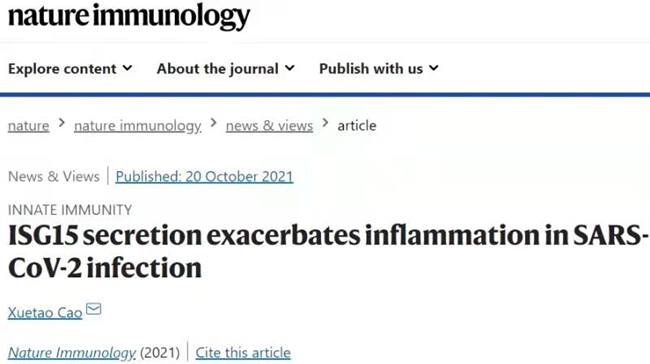Prof. Cao Xuetao was Invited to Write Comments on Inflammation in COVID-19 Infection in Nature Immunology

Recently, Nature Immunology, sub-magazine of Nature, published the comments written by Cao Xuetao, academician of Chinese Academy of Engineering and professor of College of Life Sciences, Nankai University.

The figure shows excessive inflammation in SARS-CoV-2 infection as secretory ISG15 feedback stimulates macrophages
Severity and mortality of COVID-19 are associated with evasion of virus immunity and triggering excessive inflammation and cytokine storm. Some immunotherapeutic strategies that can block the production and function of proinflammatory cytokines have been clinically proved to be able to somewhat control the course of COVID-19. It is necessary to effectively remove invading viruses by activating the natural immune response. However, abnormal activation and excessive production of proinflammatory cytokines may lead to damage to the host's own tissue. Nevertheless, very little is known about the significant increase in proinflammatory cytokines, and the more severe inflammatory damage induced by COVID-19 infection.
In view of the research paper of scientists from Oxford University on COVID-19 infection triggering macrophages to secrete inflammatory cytokines, combining with the international research progress in the field of immune inflammation regulation, Prof. Cao Xuetao explained the cellular and molecular mechanisms that why COVID-19 infection is more likely to induce inflammatory damage to the body than the common virus infection, which proposed new potential targets and recommendations for the preventive intervention or therapeutic blockading in the disease development of patient with COVID-19 pneumonia.
Nature Immunology is an international first-class academic journal in the field of immunology (influence factors 25), which publishes frontier research results and major discoveries in immunology. As for new discoveries in immunology, international renowned experts will be invited to write special comments and indicate the future research direction of the field.
Link to the Paper: https://www.nature.com/articles/s41590-021-01056-3
(Reported by Nan Xinwen, edited and translated by Nankai News Team.)









